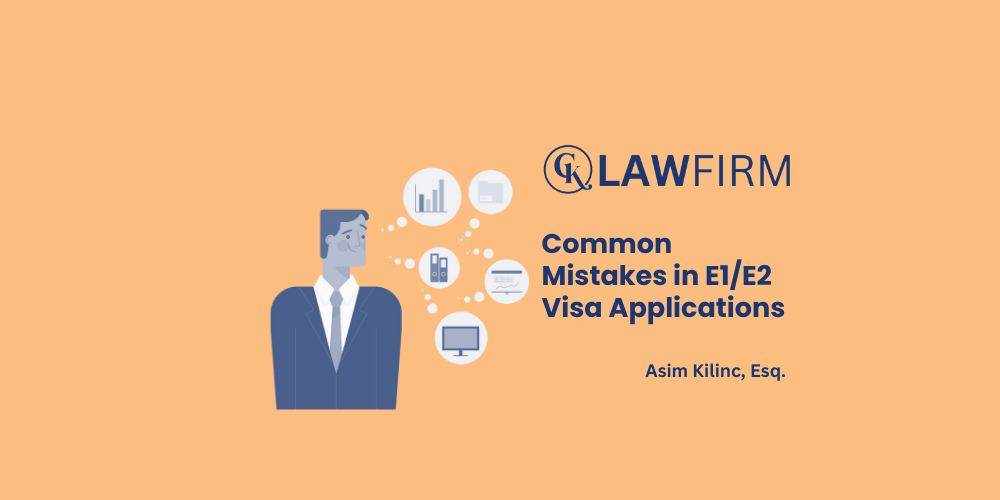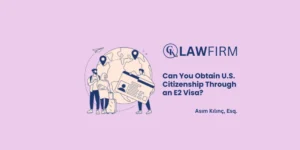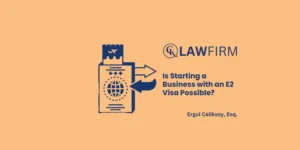Schedule an Appointment with Our Attorneys Now

Common Mistakes in E1/E2 Visa Applications
By Asim Kilinc, Immigration Attorney at CK Law Firm
E1 and E2 visas offer significant opportunities for entrepreneurs wishing to engage in trade or make investments in the United States. However, the application process for these visas can be complex, and mistakes made by applicants can lead to delays or even denials. In this article, we will thoroughly examine the most common mistakes made when applying for E1 and E2 visas and explain how to avoid them. By using this information, you can strengthen your application and increase your chances of success.
- What Are E1 and E2 Visas?
- Providing Incomplete or Incorrect Documents
- Insufficient Investment Amount
- Submitting a Weak Business Plan
- Using Personal Income for the Investment
- Misunderstanding Visa Types and Requirements
- Failing to Manage Visa Status Correctly
- Overlooking the Application Process for Family Members
If you have further questions on this topic, feel free to leave a comment below this article, send me a message directly via LinkedIn, or reach out through the website of CK Law Firm, where I am a co-founder!
What Are E1 and E2 Visas?
- E1 Visa is a trade visa granted to nationals of countries that maintain substantial trade with the United States. Applicants must provide evidence of significant trade with the U.S.
- E2 Visa is for investors who make a significant capital investment in the U.S. It is suitable for entrepreneurs who want to start a business or take over an existing one.
Both visa types offer significant opportunities for businesspeople looking to trade or invest in the U.S., but mistakes made during the application process can lead to serious issues.
Here are the most common mistakes encountered in E1 and E2 visa applications:
1. Providing Incomplete or Incorrect Documents
One of the most common mistakes during the application process is submitting incomplete or incorrect documents. E1 and E2 visa applications require meticulous and detailed documentation. For instance, applicants for the E1 visa must prove that they conduct regular and substantial trade with the U.S. Meanwhile, E2 visa applicants need to present evidence that their investment is “substantial.”
- For the E1 visa, you must provide documents such as trade invoices, shipping documents, and agreements with your U.S. trade partners to substantiate your trade volume.
- For the E2 visa, you need to provide documentation on the size of the investment, the source of the funds, your business plan, and how the investment will contribute to the U.S. economy. Submitting incomplete or incorrect documents can delay or even result in the rejection of your application.
Tips:
- Ensure that all documents are complete.
- Carefully review the official guidelines provided by the U.S. government to make sure that your documents are current.
2. Insufficient Investment Amount
For E2 visa applications, the investment must be deemed “substantial.” However, many applicants misjudge the required investment amount and apply with insufficient funds. If the U.S. government determines that the investment is not large enough to benefit the U.S. economy, the application may be denied.
- The concept of substantial investment varies depending on the type and needs of the business. For example, opening a large factory will require a higher investment, whereas a smaller business might require less. However, you must ensure that the investment is sufficient to meet the needs of the business.
Tips:
- Determine your investment amount based on the actual needs and sustainability of the business. Be detailed in your business plan, explaining every financial item.
- Consider the industry requirements and how your investment will benefit the U.S. economy.
3. Submitting a Weak Business Plan
For E2 visa applicants, the business plan plays a crucial role in the approval process. Many applicants are denied because they fail to provide a sufficiently detailed business plan. The plan must demonstrate that the investment is sustainable and that it will contribute to the U.S. economy. Visa officers want to see that the business will succeed in the long run.
- The business plan should include financial projections, staffing needs, growth strategies, and market analysis. A superficial or inadequate business plan can lead to the denial of your application.
Tips:
- Detail every aspect of your business in the plan, especially focusing on financial projections and job creation in the U.S.
- Have your business plan reviewed by an expert and ensure that it complies with U.S. legal requirements.
4. Using Personal Income for the Investment
Many applicants apply for an E2 visa using only personal income. However, the U.S. government often does not consider personal income sufficient. The investment must be based on a broader financial base to support the sustainability and growth of the business.
- The structure of your investment must meet the needs of the business to ensure a positive outcome for your application.
Tips:
- Ensure that your investment contributes to the growth and sustainability of the business.
5. Misunderstanding Visa Types and Requirements
One of the most common mistakes is applying for the wrong visa due to a misunderstanding of the differences between E1 and E2 visas. The E1 visa is for nationals of countries that engage in trade with the U.S., while the E2 visa is for those who wish to invest in the U.S. Not understanding the key differences between these visas can lead to a denial.
Tips:
- Understand which visa type is suitable for your situation before applying.
- Carefully analyze whether you meet the requirements for both visa types.
6. Failing to Manage Visa Status Correctly
E1 and E2 visas are typically temporary, meaning you cannot stay in the U.S. indefinitely. However, many applicants mistakenly believe that these visas lead to permanent residency (Green Card) and develop incorrect strategies. Since these visas do not provide permanent residency, you need to take the correct steps to extend or renew your stay.
Tips:
- Keep track of your visa expiration date and apply for extensions on time.
- Consider other paths to permanent residency, remembering that this process is separate from E1/E2 visas.
7. Overlooking the Application Process for Family Members
E1 and E2 visa holders’ spouses and children under 21 also have the right to live in the U.S. However, there are separate application processes for these family members. Many applicants overlook this process, leading to complications for their family members.
Tips:
- Remember that separate applications are required for your spouse and children.
- Prepare all necessary documents accurately and completely for family members’ applications.
Conclusion
E1 and E2 visas provide valuable opportunities for those looking to trade or invest in the U.S. However, mistakes during the application process can have serious consequences and lead to visa denial. By avoiding the common errors listed above, you can strengthen your application and secure your opportunity to do business in the U.S. Submitting the correct documentation, preparing a comprehensive business plan, and managing your visa status properly will increase your chances of success. For more information and consultancy services, feel free to reach out to us via our website at cklawfirm.org, by email at info@cklawfirm.org, or through LinkedIn.
Who is Attorney Asım Kılınç?
Attorney Asım Kılınç is the co-founder of CK Law Firm and is recognized for his expertise in immigration law and U.S. asylum applications. Kılınç completed his Master’s degree at Southern Methodist University Dedman School of Law and is a member of the Missouri Bar Association, with a focus on U.S. immigration law.
Attorney Kılınç’s extensive knowledge and experience in immigration law have significantly contributed to CK Law Firm’s success in this field. He has actively participated in the preparation of over 1,000 cases, demonstrating his expertise in this area. By providing comprehensive and professional legal support to his clients, he helps them adapt to their new lives in the U.S.
Attorney Kılınç is also well-versed in U.S. asylum applications. He meticulously guides his clients through the process and ensures they receive the best legal advice. He provides top-quality service to clients in matters of citizenship, Green Card, work permits, and other immigration processes, supporting them from start to finish on their journey to U.S. citizenship.
Attorney Asım Kılınç, who solidifies CK Law Firm’s leadership in immigration law and U.S. asylum applications, offers reliable and effective legal consultancy services to clients, assisting them in building a new life in the U.S.





